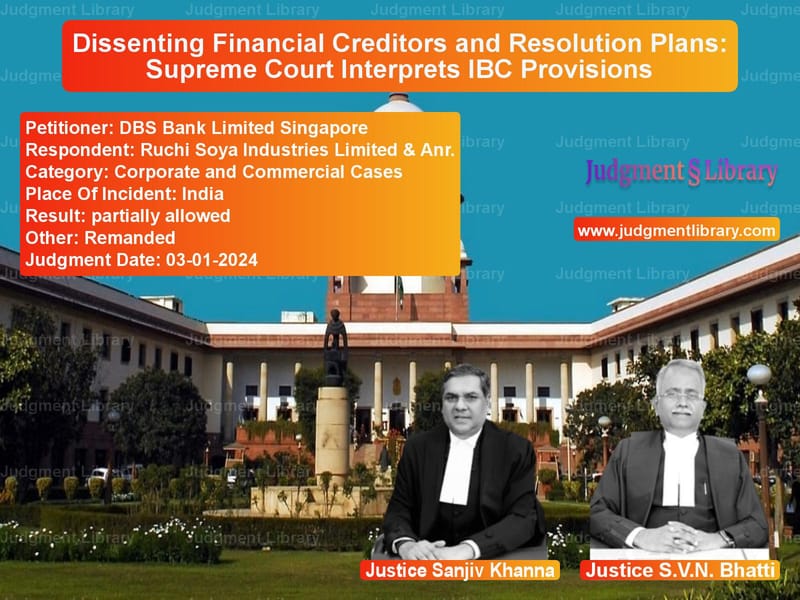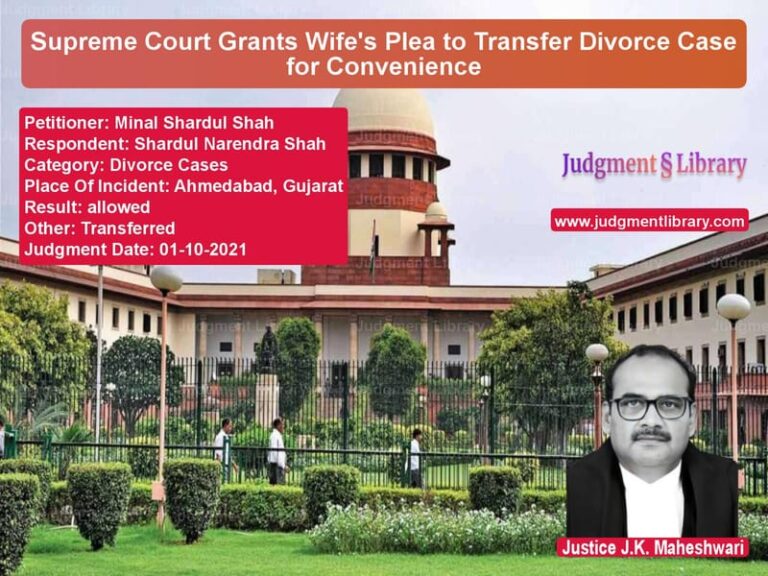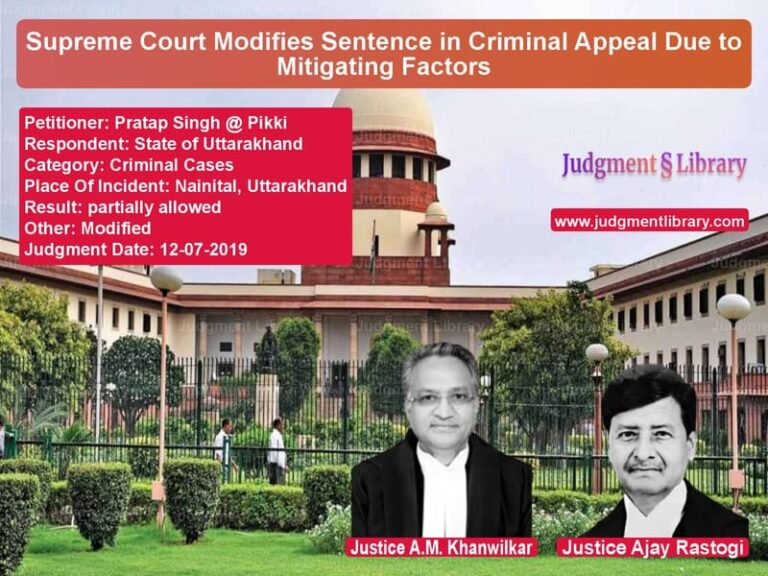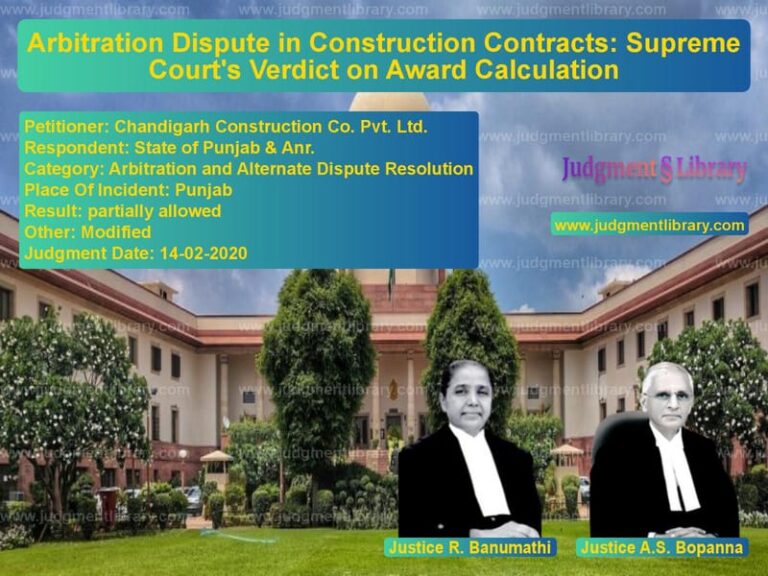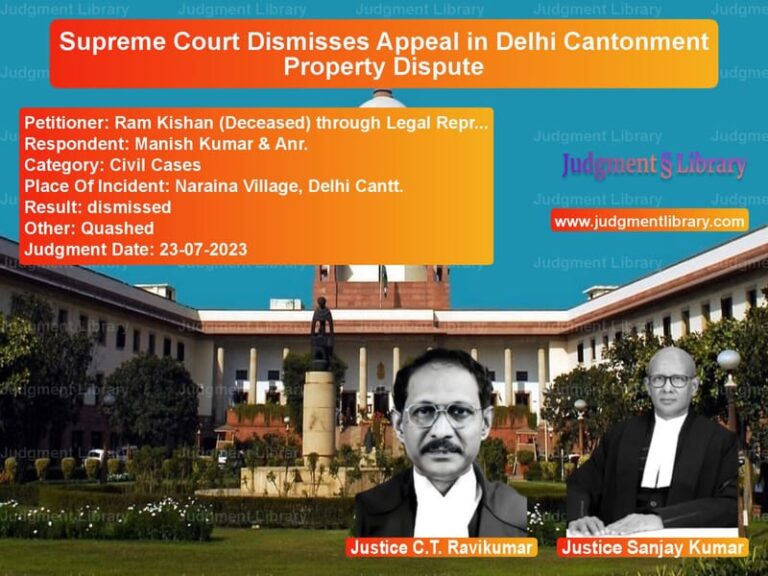Dissenting Financial Creditors and Resolution Plans: Supreme Court Interprets IBC Provisions
The Supreme Court of India, in its judgment dated 3 January 2024, addressed an important question regarding the rights of dissenting financial creditors in corporate insolvency resolution processes under the Insolvency and Bankruptcy Code, 2016 (IBC). The case, DBS Bank Limited Singapore vs. Ruchi Soya Industries Limited & Anr., focused on whether a dissenting financial creditor is entitled to receive the minimum value of its security interest when a resolution plan is approved.
Background of the Case
The appellant, DBS Bank Limited Singapore, had extended a financial debt of approximately USD 50 million (Rs. 243 crore) to Ruchi Soya Industries Limited. The debt was secured by a first charge over certain immovable and fixed assets of the corporate debtor in Kandla, Gujarat, and other locations in Rajasthan and Madhya Pradesh.
On 15 December 2017, Corporate Insolvency Resolution Process (CIRP) was initiated against Ruchi Soya under the IBC. The Resolution Professional (RP) admitted DBS Bank’s claim at Rs. 242.96 crore. Subsequently, on 20 March 2019, Patanjali Ayurvedic Limited submitted a resolution plan of Rs. 4,134 crore against the total admitted claims of Rs. 8,398 crore, representing a recovery of 49.22% for financial creditors.
Dissent by DBS Bank and Distribution of Proceeds
DBS Bank objected to the proposed pari passu (equal) distribution of resolution proceeds among secured financial creditors, arguing that:
- It held a sole and exclusive first charge over certain assets.
- The liquidation value of its security interest was Rs. 217.86 crore.
- Its distribution under the approved resolution plan was only Rs. 119 crore, significantly lower than its security interest value.
Despite DBS Bank’s objections, the Committee of Creditors (CoC) approved the resolution plan with a 96.95% vote on 30 April 2019. As DBS Bank voted against the plan, it became a dissenting financial creditor.
Legal Challenge by DBS Bank
DBS Bank challenged the distribution mechanism before the National Company Law Tribunal (NCLT), Mumbai, arguing that Section 30(2)(b)(ii) of IBC, as amended in 2019, required dissenting financial creditors to be paid at least the liquidation value of their security interest. The NCLT dismissed the challenge on 24 July 2019.
On 16 August 2019, the IBC (Amendment) Act, 2019 introduced changes, ensuring that dissenting financial creditors receive at least their entitlement under Section 53(1) (the liquidation waterfall mechanism). DBS Bank requested a reconsideration of the distribution at the 26th CoC meeting on 30 August 2019, but the CoC declined, citing ambiguity in the amendments.
On 4 September 2019, the NCLT granted final approval to the resolution plan. DBS Bank filed appeals before the National Company Law Appellate Tribunal (NCLAT), but both were dismissed on 18 November 2019 and 9 December 2019, leading to the present appeal before the Supreme Court.
Petitioner’s Arguments
DBS Bank contended that:
- Section 30(2)(b)(ii) mandates that dissenting financial creditors should not receive less than their liquidation value.
- Ignoring the value of security interest undermines the purpose of secured lending.
- The amendments applied to pending cases, and therefore, the CoC was bound to distribute proceeds accordingly.
- The CoC’s decision resulted in an unjust windfall for other creditors with inferior security.
Respondent’s Arguments
The CoC and other respondents argued that:
- The distribution mechanism was approved by 96.95% of the CoC and should not be disturbed.
- The commercial wisdom of the CoC prevails over individual creditor claims.
- Section 30(2)(b)(ii) does not entitle a dissenting financial creditor to a preferential distribution.
Supreme Court’s Ruling
The Supreme Court, led by Justice Sanjiv Khanna and Justice S.V.N. Bhatti, ruled in favor of DBS Bank and referred the issue to a larger bench for definitive interpretation.
Key observations:
- Section 30(2)(b)(ii) ensures that dissenting financial creditors receive at least their liquidation value.
- CoC’s commercial wisdom cannot override statutory protections granted to dissenting creditors.
- A dissenting financial creditor must receive compensation equivalent to its security interest, rather than being treated on par with unsecured creditors.
- The IBC amendments of 2019 apply retrospectively to pending cases.
Impact of the Judgment
This ruling has significant implications for insolvency proceedings:
- Ensures fairness for secured financial creditors who dissent.
- Clarifies that liquidation value is a minimum threshold for distribution.
- Sets a precedent for how dissenting creditors should be treated under IBC.
- Strengthens investor confidence in secured lending.
Conclusion
The Supreme Court’s judgment in DBS Bank vs. Ruchi Soya underscores the importance of protecting dissenting financial creditors in insolvency resolution. By interpreting Section 30(2)(b)(ii) in favor of secured creditors, the Court ensures that creditor rights and commercial fairness remain fundamental principles of the IBC framework.
Petitioner Name: DBS Bank Limited Singapore.Respondent Name: Ruchi Soya Industries Limited & Anr..Judgment By: Justice Sanjiv Khanna, Justice S.V.N. Bhatti.Place Of Incident: India.Judgment Date: 03-01-2024.
Don’t miss out on the full details! Download the complete judgment in PDF format below and gain valuable insights instantly!
Download Judgment: dbs-bank-limited-sin-vs-ruchi-soya-industrie-supreme-court-of-india-judgment-dated-03-01-2024.pdf
Directly Download Judgment: Directly download this Judgment
See all petitions in Bankruptcy and Insolvency
See all petitions in Company Law
See all petitions in Corporate Governance
See all petitions in Shareholder Disputes
See all petitions in unfair trade practices
See all petitions in Judgment by Sanjiv Khanna
See all petitions in Judgment by S.V.N. Bhatti
See all petitions in partially allowed
See all petitions in Remanded
See all petitions in supreme court of India judgments January 2024
See all petitions in 2024 judgments
See all posts in Corporate and Commercial Cases Category
See all allowed petitions in Corporate and Commercial Cases Category
See all Dismissed petitions in Corporate and Commercial Cases Category
See all partially allowed petitions in Corporate and Commercial Cases Category

